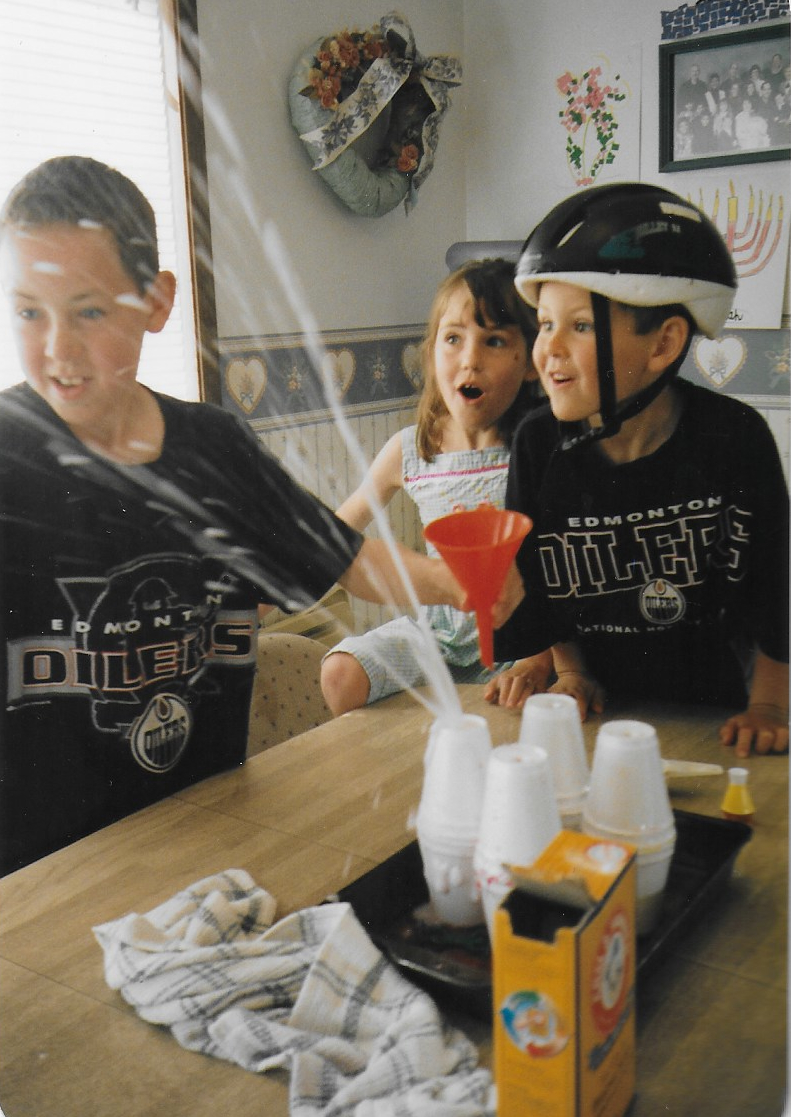When I think back on my elementary school years, I picture a kitchen table, backyard trampoline breaks and my brothers goofing off during morning reading.
I was home-schooled. My mom, Sue Holtby (Hammond), '84 BSc(PT), educated me and my three siblings for a total of nearly 15 years for the four of us before we went on to public high school. So when classes were cancelled due to the COVID-19 crisis and parents across the country became home-schoolers, I called my mom to reminisce.
While other kids raved about the Scholastic Book Fair, I anxiously waited for the day in late August when a 15-kilogram box would arrive on our doorstep. I'd rip off the tape and devour the dust jacket summaries of the books on my year-long reading list.
My family also embraced a few stereotypical "nerdy" home-school activities. My younger siblings and I memorized actions to mime the history of Canada in under 90 seconds. I can still sing the names of every country in the former USSR thanks to a catchy educational cassette. I have used neither of those skills recently.
Alongside these memories, I can picture less blissful days - vicious sibling squabbles, tears shed into math books and moments where my mom just had to excuse herself for a midday nap.
I know my schooling is not directly comparable to today's COVID-19-caused shift in education. I am conscious that teachers are still at work, changing plans on a dime to deliver courses online, by email, chat and video meetings. But parents at home are trying to help by becoming, if not teachers, then tutors. I thought my mom might have some advice for them. So pull up a seat at the kitchen table.
Tip 1: Make the schedule the bad guy
The tough part about having children home all day is that you're constantly in parenting mode, my mom says, and kids will find opportunities to argue when a parent is giving all the instruction.
Her solution? Every Sunday, she made a simple schedule for each of us with a list of daily chores and school subjects. The schedule didn't lay out specific times, just the tasks.
"That way, the schedule was dictating what needed to be done. There was less opportunity for you kids to ask, 'Do I have to do that today?' if the paper said so," she says.
It's spring break in some jurisdictions, but elsewhere, kids are already doing online assignments and even video lessons from teachers. To help them along, Mom recommends letting children review their work independently and giving them the freedom to choose when they tackle each subject, while you stay available to answer questions.
This flexible schedule could even help distracted learners, she adds. "For a child with concentration difficulties, they could do math over a couple of different sessions. They could go outside for a bit, then come back to it. They don't have to sit for long periods if they find it hard."
Another benefit of the preset flexible schedule? Free time was even more fun when we earned it. My mom advises that even if kids grumble about the schedule (and I remember grumbling), they probably won't complain about being bored.
Tip 2: Encourage individual interests
When it comes to play, being at home all day creates opportunities for kids to discover new hobbies. Children might even be motivated to get through their schoolwork early, so they can move on to free time.
For example, my older brother's electric guitar was the soundtrack to many of my mornings. While I developed a great ability to tune out background noise, his musical skill grew quickly. Who knows? The extra time kids invest in hobbies could even lead to a future career. My brother became a guitar teacher in his teens, before going on to a music diploma and education degree.
If you have a curious teen, the University of Alberta offers 10 free massive open online courses (MOOCs) and a summary of how the classes align with Alberta's curriculum by grade level. With courses on everything from mountains to dinosaurs to computer programming and video games, teens can gain a deeper understanding of their favourite subject.
Tip 3: Say sorry … often
Some days, things will go wrong. The schedule will go out the window. A sister will provoke a fight with her brother. Someone will cry.
On those days, my mom says there's nothing more powerful than an apology. "When you're in such close contact, you can make wonderful memories or it can lead to bitterness," she says. "Family tensions can build up. We all need to ask for and extend forgiveness."
My mom says parents can feel a lot of pressure to get things right. Whether you are home-schooling or just helping your child stay on track during this difficult time, Mom says it's important to forgive yourself when things go wrong.
"Sometimes we blow it. But it's important to be gracious to ourselves," she says. "And I do believe if you give an apology, it gives everyone the freedom to say, 'We all mess up. We're in this together.'"
Below, Philip, Anna and David Holtby are surprised by a successful kitchen science experiment during a home-school lesson in 2001.


We at New Trail welcome your comments. Robust debate and criticism are encouraged, provided it is respectful. We reserve the right to reject comments, images or links that attack ethnicity, nationality, religion, gender or sexual orientation; that include offensive language, threats, spam; are fraudulent or defamatory; infringe on copyright or trademarks; and that just generally aren’t very nice. Discussion is monitored and violation of these guidelines will result in comments being disabled.